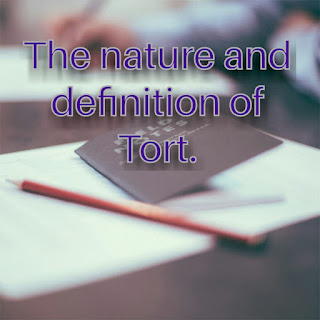The word tort has been derived from the Latin term Tortum which means to twist or crooked . It includes that conduct which is not straight or lawful but on the other hand twisted crooked or unlawful it is equivalent to English term wrong. When the wrongdoer violates a legal right vested in another person. Thus tort is violation of some legal right vested in another person but it is different to crime. In crime there is violation of duty recognised by criminal law. Tort is violation of civil rights.
Till now there is no certain definition of tort which includes all the elements of torts. It is due to vastness of the subject. For the definition of tort we should study the historical background of tort. The origin of tort lies in the writ of trespass. The writ of trespass were responsible for the development of various other wrongs. And certain other wrongs have originated independently. Branch of tort is a growing branch of law. It includes various wrongs which is not criminal or equitable wrongs. It is different from the breach of contract and breach of trust. Now we should analyse some definitions of torts.
Definition of Tort.
According to Salmond. “ Tort is a civil wrong for which the remedy is common law action for unliquidated damages and which is not exclusively the breach of contract or the breach of a trust or other merely equitable obligation.”
According to Winfield. ” tortious liability arises from the breach of a duty primarily fixed by the law : this duty is towards persons generally and its breach is redressible by an action for unliquidated damages.”
According to Fraser ” It is an infringement of a right in rem of a private individual giving a right of compensation at the suit of the injured party.“
Section 2 of the limitation act 1963 also defines tort according to it ” Tort is a civil wrong which is not exclusively a breach of contract or breach of a trust.”
Essential element of Tort.
Conclusion.
Enter your email address to subscribe our newsletter :
